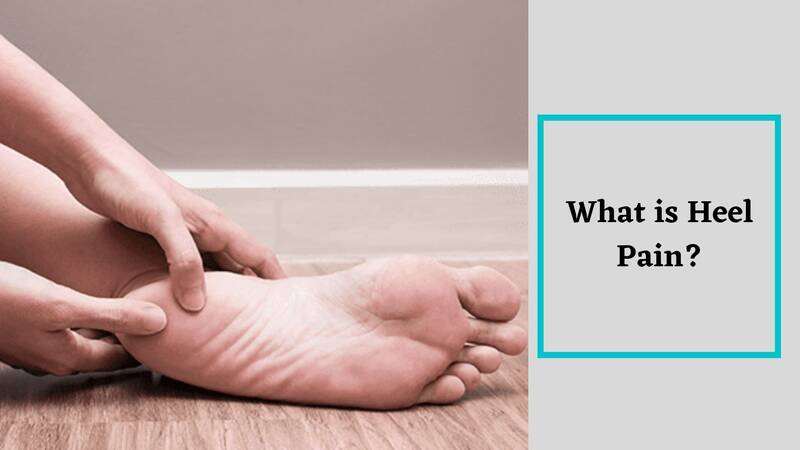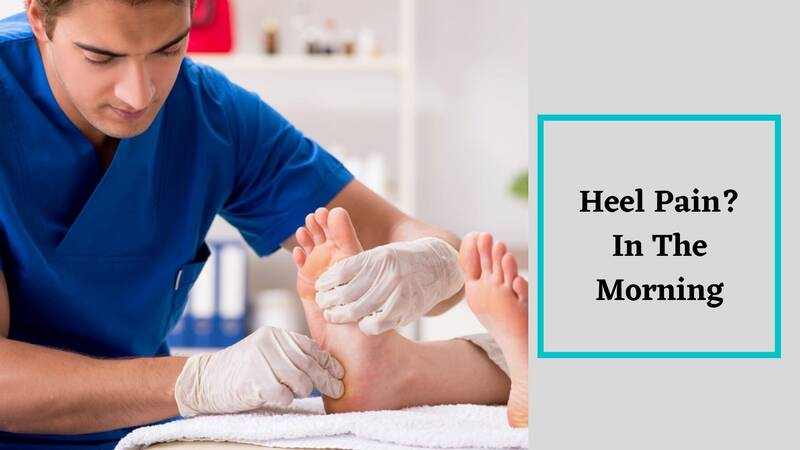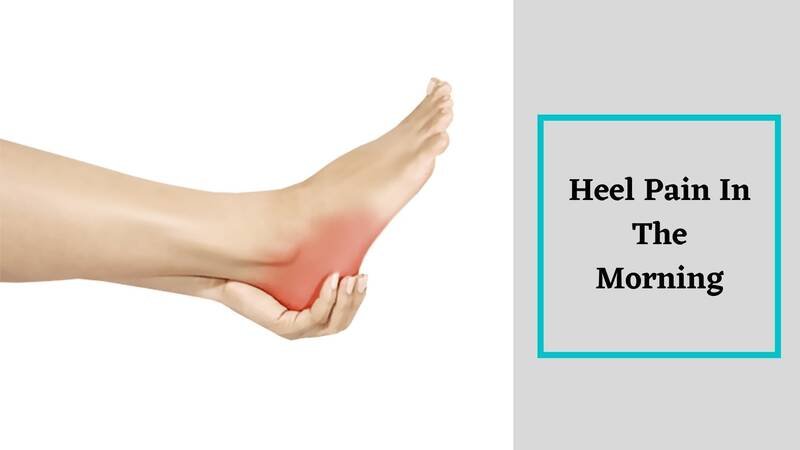You may feel the pain or stiffness in your heel while lying down in bed by waking up in the morning with heel pain.
Even when you wake up in the morning, you can feel this.
It is why we will discuss the probable causes and treatment for heel pain in the morning.
Morning heel pain may be due to Achilles tendonitis or plantar fasciitis, which can be due to an injury related to a stress fracture.
Heel pain is treated at the time with at-home remedies like rest and ice.
If pain is more debilitating, then a podiatrist or a doctor can screen the symptoms and the recommended treatment.
Continue to read to learn about a few probable causes of heel pain in the morning!
Contents
Risk factors for heel pain in the morning
Anything imposing a lot of strain and pressure on your foot leads to heel pain.
The manner you walk, and the shape of your foot are also the included factors.
You will more likely be developing heel pain if:
- You are obesity
- Having ankle and foot arthritis, high foot and flat feet arches
- Jump or run a lot in sports as well as for exercises
- Spending enough time standing mainly on the concrete floors
- When you wear improperly fitted shoes without any cushion or arch support
What is heel pain?

Heel pain is associated with a common foot and ankle issue. Pain can occur under the heel or behind it. Various conditions cause pain in the heels
It is vital to get the condition medically evaluated to help you in determining the exact cause of your heel pain, allowing the proper treatment regimen to start.
Heel pain can make it tough for you to walk and participate in daily activities.
The pain of the heel conditions can improve with nonsurgical treatments since your body requires time to recover.
Plantar fasciitis
The condition where the plantar fascia, which is a thick ligament at the bottom of your foot, gets irritated is Plantar fasciitis.
The symptoms included here are the pain or stiffness in the feet or heels.
Some symptoms get worse in the morning due to a poor supply of blood to the heel and foot area while you are resting.
Plantar fasciitis is a common type of injury for athletes and runners.
Athletics places a lot of stress on their heels and feet.
Cross-training about a few times a week and activities like swimming and cycling can help.
Wearing the right kind of footwear and changing out even with running shoes every 400 to 500 miles prevents the overuse of pain.
It generally takes about a few minutes of activity, such as a few minutes of walking, to warm up the areas for relieving pain if you have plantar fasciitis.
Achilles tendonitis
The Achilles tendon can become extremely inflamed with the band of tissues connecting the calf muscles to the heel bone.
It results in Achilles tendinitis or the pain and stiffness in the heel area.
Symptoms can worsen in the morning due to the circulation of pain throughout different body parts that are limited to rest.
You can feel the pain and discomfort throughout the entire day if you have Achilles tendinitis, unlike plantar fasciitis.
Rheumatoid arthritis
There is a greater risk for plantar fasciitis among people with rheumatoid arthritis, resulting in heel pain in the morning.
Your physician might recommend you wear a night splint to keep your foot flexed during the night if symptoms do not improve any home remedy.
Stress fracture
You undergo a stress fracture in your heel from overuse, improper technique, or intense athletic activities.
You can notice that the pain develops over days and weeks and the swelling it can also hurt while walking.
You are more likely to be experiencing pain throughout the day if you check out a stress fracture.
Check out your doctor sooner if you suspect that you have a stress fracture.
Hypothyroidism
Morning heel discomfort is a symptom of hypothyroidism.
Inflammation and swelling in the foot, ankles, and heels can occur when chemicals and hormones in the body are disrupted.
It can also induce tarsal tunnel syndrome, a pinched or injured tibial foot nerve.
Your doctor may offer a blood test to examine your thyroid if you have unexplained morning heel pain and hypothyroidism symptoms.
Symptoms of heel pain in the Morning
The pain in the heel has a symptom that varies depending on the cause. You may experience the following along with the pain:
- The bony growth on the heel.
- Discoloration (bruising or redness).
- Stiffness
- Swelling
- Tenderness
- Pain after standing from a resting/sitting position.
Diagnosis for Heel Pain
Your healthcare service provider will assess your symptoms and perform a physical examination.
You can also get X-rays to check for bone fractures, arthritis, joint damage, and bone alignment.
You may even need an ultrasound or MRI. It is seen that soft tissue problems can’t be revealed through X-rays.
Read– Benefits of Ice Bath
Complications for heel pain
Heel pain can make it difficult to move about, work, exercise, and do daily duties.
When moving hurts, it’s easy to become inactive. Weight gain can occur as a result of a sedentary lifestyle.
You may also become depressed due to not being able to do the things you enjoy.
If left untreated, Achilles tendinitis can lead to tendon rupture (tendinosis).
The Achilles tendon can tear or rupture over time, and this issue may necessitate surgery.
Managing or treating heel pain

Several issues cause heel pain that can get better over time and nonsurgical treatments.
Some therapies focus on easing inflammation and pain to improve foot flexibility and reduce stress and strain on the heel.
The following are the treatments included:
Injections
The steroid injections can ease the swelling and pain.
There are steroid injections that should rarely be given for the tendon issue that can surely help bursitis and plantar fasciitis.
Orthotic devices
Orthotics (over-the-counter or custom-made shoe inserts) help relieve strain on the heel.
Wearing a splint at night can help some people, especially with morning pain.
More severe symptoms may need a walking boot, and you may need to switch to more supportive shoes for everyday wear and exercise.
Pain relievers
The NSAIDs or nonsteroidal anti-inflammatory drugs can be combined with ice packs to ease swelling and pain.
Physical therapy
The adhesions in the soft tissues can be broken by massage, physical therapy, and ultrasound therapy, and these are the treatments that reduce inflammation and pain.
Stretching exercises
Your healthcare provider will be showing you about to perform the heel stretching exercises for the muscles and tight tendons.
Heel pain in the morning can happen due to plantar fasciitis, but several other conditions can cause this kind of pain.
Home remedies include ice and stretching to help during the morning heel pain.
Read– Mustard For Cramps
Preventing heel pain
Excessive pressure and strain on your feet, particularly your heels, can result from being overweight.
It is advantageous to your feet to lose weight and maintain a healthy weight by combining exercise regularly with a healthy, balanced diet.
It’s also crucial to wear the right shoes. Shoes with a small to moderate heel that protects and cushions your arches and heels are ideal, and shoes with no heels are avoided.
Read– Stairmaster Benefits for fitness
FAQs
Below we share some FAQs related to the “Heel Pain in the Morning”
1〉 How can you get rid of heel pain in the Morning?
Ibuprofen and naproxen are pain medications that can help with heel pain and inflammation.
It’s crucial to ice the heel and relax and elevate the foot.
Before taking any medication just consult with your health care provider.
2〉 When I get out of bed, why do my heels hurt?
The plantar fascia is a ligament-like structure supporting the arch and runs from the bottom of the heel to the end of the foot.
Plantar fasciitis causes a strong discomfort when you first get out of bed in the morning, which subsides as you walk.
3〉 Why does walking after sleeping hurt my heel?
The two common heel pain that occurs while you are asleep is overuse of injuries and plantar fasciitis, and it is the common reason for early morning heel pain that normally fades away once you start to move your feet.
4〉 When I wake up, why do the tops of my feet hurt?
The plantar fascia greatly reduces overnight, so this happens first thing in the morning.
“The fascia shortens during sleep or prolonged sitting, causing tightness, especially in the initial few steps.”
The soreness normally goes away within a few minutes of walking because the fascia loosens.”
5〉 Is it possible for plantar fasciitis to go away?
Plantar fasciitis can now go away on its own, but the discomfort might last for more than a year.
Complications may ensue if treatment is not received.
It’s best to consult your doctor soon and begin nonsurgical therapy.
6〉 Can I get rid of plantar fasciitis?
Rest and unobtrusive therapies like custom orthotics to elevate your heel and foot arches can often cure minor plantar fasciitis.
Anti-inflammatory and pain-relieving drugs are also available over-the-counter.
7〉 Is plantar fasciitis a serious condition?
As if getting out of bed in the morning wasn’t difficult enough, many people experience piercing aches in their feet as they stumble to the bathroom.
8〉 What is the most common reason for heel pain?
Plantar fasciitis (heel pain) and Achilles tendinitis are the most prevalent causes of heel discomfort (back of the heel).
Achilles tendonitis is the other cause of heel pain. Rupture of the Achilles tendon.
9〉 What are the three different types of plantar fasciitis?
Obesity, regular exercise, occupation, maternity, and foot structure are all common causes of plantar fasciitis.
A long, thin ligament that stretches along the bottom of your foot is known as the plantar fascia since it connects to the heel at the front of the foot and provides arch support.
10〉 What causes plantar fasciitis to worsen?
Running, walking, or standing wearing unsupportive shoes are the behaviors that can remove the tension through your feet and cause plantar fasciitis.
You can run, walk, or stand on firm surfaces such as concrete.
You have to carry a large object or acquire weight.
Read– Benefits of Botox
Key Takeaway
- The heel is mainly a padded cushion of fatty tissue responsible for holding its shape despite the pressure implied through body movement and weight.
- Obesity, running and jumping on tough surfaces, injuries, and certain diseases may cause heel pain in the morning.
- Plantar fasciitis happens when the ligament responsible for running the length of the foot due to inflammation is caused mainly due to overstretching.
- The result is pain under the heel, specifically after resting.
- The bony growth that is not usually painful to touch is the heel spur.
- Sever’s disease is caused due to stress on the growth plate of the heel bone.
Read– Ear Piercing For Anxiety
- Understanding HIPAA Compliance: Obligations for Covered Entities and Business Associates - April 23, 2024
- Things to Invest in for the Easter Season in 2024 - March 29, 2024
- Why Experience Matters: Finding An Established Dental Implants Provider - March 29, 2024
